CellXVivo Human Th17 Cell Differentiation Kit
CellXVivo Human Th17 Cell Differentiation Kit Summary
Kit Summary
For the differentiation of Th17 cells from a preparation of naïve CD4+ T cells.
Key Benefits
- Generate a 20-fold increase of Th17 polarized cells
- Contains high quality bioactive proteins
- Provides optimized reagents needed to induce Th17 differentiation
- Includes straightforward procedures
- Does not require specialized instrumentation
Why Differentiate Th17 Cells In Vitro?
T helper type 17 (Th17) cells are a subset of CD4+ effector T cells that promote cell-mediated immune responses against extracellular bacteria and fungi. Differentiation into the Th17 lineage is promoted by cytokines such as TGF-beta and IL-6, while their survival and expansion are dependent on IL-21 and IL-23. Th17 cells secrete TNF-alpha, IL-6, IL-9, IL-17A, IL-17F, IL-21, IL-22, and (human) IL-26/AK155. Th17 polarized cells are present in low abundance in normal human peripheral blood. In vitro differentiation of Th17 cells from the larger naïve CD4+ T cell population provides increased numbers of Th17 cells to facilitate downstream research.
This kit contains the following optimized proteins and reagents to drive efficient differentiation of naïve CD4+ T cells into Th17 polarized cells.
- Mouse Anti-Human CD3 Antibody
- Mouse Anti-Human CD28 Antibody
- Human Th17 Reagent 1
- Human Th17 Reagent 2
- Human Th17 Reagent 3
- Human Th17 Reagent 4
- Human Th17 Reagent 5
- Reconstitution Buffer 1
- Reconstitution Buffer 2
- Reconstitution Buffer 3
- 20X Wash Buffer
The quantity of the components in the kit is sufficient to differentiate one 24-well plate, or approximately 2.5-5 x 106 naïve CD4+ T cells, and generate a 20-fold increase of Th17 polarized cells within your starting CD4+ T cell population.
Stability and Storage
Store the unopened kit at 2 to 8 °C. After opening the kit, Mouse Anti-Human CD3 Antibody, Mouse Anti-Human CD28 Antibody, and Human Th17 Reagents 1-5 can be stored at 2-8 °C under sterile conditions for up to 30 days or at -20 °C to -70 °C in a manual defrost freezer for up to 3 months. Reconstitution Buffer 1, Reconstitution Buffer 2, Reconstitution Buffer 3, and 20X Wash Buffer may be stored under sterile conditions for up to 3 months at 2 to 8 °C. Do not use beyond the expiration date of the kit.
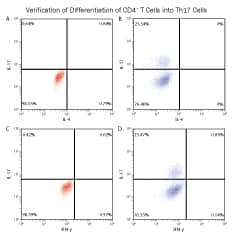 View Larger Image |
Intracellular Cytokine Staining of Differentiated Human Th17 Cells. Flow cytometry data showing human peripheral blood naïve CD4+ T cells without (A, C) and with (B, D) a 10-day differentiation using reagents included in this kit. On day 10 of differentiation, the cells were stimulated with Cell Activation Cocktail (Tocris®, Catalog # 5476) and stained with APC-conjugated Mouse Anti-Human IL-17 Monoclonal Antibody (Catalog # IC317A), PE-conjugated Mouse Anti-Human IFN-gamma Monoclonal Antibody (Catalog # IC285P) and a Fluorescein-conjugated Mouse Anti-Human IL-4 Monoclonal Antibody (Catalog # IC204F). Quadrants were placed based on isotype control-stained samples. |
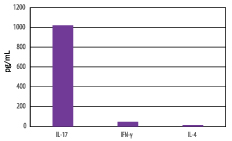 View Larger Image |
Th17-differentiated Human CD4+ Cells Secrete IL-17. Human peripheral blood naïve CD4+ T cells were differentiated for 10 days under Th17 polarization conditions using reagents included in this kit. On day 10, cell culture supernatant was collected and cytokine expression was determined using the Human IL-17 Quantikine® ELISA Kit (Catalog # D1700), the Human IFN-gamma Quantikine® ELISA Kit (Catalog # DIF50), and the Human IL-4 Quantikine® ELISA Kit (Catalog # D4050). |
Specifications
Product Datasheets
Assay Procedure
Refer to the product datasheet for complete product details.
Briefly, human CD4+ T cells can be differentiated into Th17 cells using the following procedure:
- Coat plate with Mouse Anti-Human CD3 antibody
- Isolate naïve CD4+ T cells from human PBMCs
- Culture naïve CD4+ T cells in Human Th17 Cell Differentiation Media for 10 days
- Verify differentiation into Th17 cells by flow cytometry
Reagents Supplied in the CellXVivo™ Human Th17 Cell Differentiation Kit (Catalog # CDK003C):
- Mouse Anti-Human CD3 Antibody
- Mouse Anti-Human CD28 Antibody
- Human Th17 Reagent 1
- Human Th17 Reagent 2
- Human Th17 Reagent 3
- Human Th17 Reagent 4
- Human Th17 Reagent 5
- Reconstitution Buffer 1
- Reconstitution Buffer 2
- Reconstitution Buffer 3
- 20X Wash Buffer
Reagents
- Ficoll-Hypaque™
- MagCellect™ Human Naïve CD4+ T Cell Isolation Kit (R&D Systems, Catalog # MAGH115, or equivalent)
- X-VIVO™15 Chemically Defined, Serum-free Hematopoietic Cell Medium (Lonza, or equivalent)
- Penicillin/Streptomycin (optional)
- Cell Activation Cocktail 500X (Tocris, Catalog # 5476)
Equipment
- Tissue culture flasks and/or plates
- Sterile deionized water
- Microscope7
- Hemocytometer
- 37 °C and 5% CO2 incubator
- Centrifuge
- Pipettes and pipette tips
- Sterile deionized water
R&D Systems Protocol for human Th2 cell differentiation
Coat wells of a 24-well plate with Mouse Anti-Human CD3 Antibody.
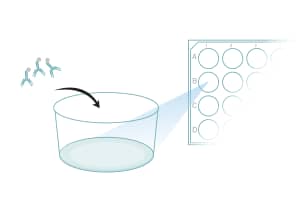
Isolate PBMCs from human blood.
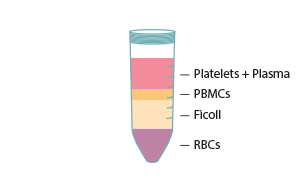
Isolate human naïve CD4+ T cells from PBMCs (e.g., using magnetic cell selection).
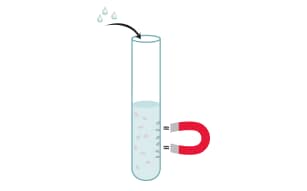
Perform a cell count.

Suspend 1-2 x 105 naïve CD4+ T cells/mL in Human Th17 Cell Differentiation Media
Culture the cells on plates pre-coated with Mouse Anti-Human CD3 Antibody for 10 days.
Refresh the Differentiation Media every 2-3 days.
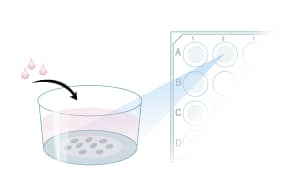
Verify Th17 cell differentiation by analyzing cytokine expression using flow cytometry.
The Th17 cells are now ready for further downstream applications.
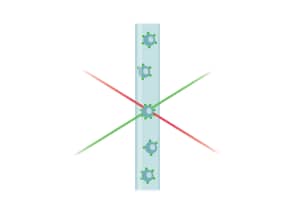
Citation for CellXVivo Human Th17 Cell Differentiation Kit
R&D Systems personnel manually curate a database that contains references using R&D Systems products. The data collected includes not only links to publications in PubMed, but also provides information about sample types, species, and experimental conditions.
1 Citation: Showing 1 - 1
-
Biotin Deficiency Induces Th1- and Th17-Mediated Proinflammatory Responses in Human CD4(+) T Lymphocytes via Activation of the mTOR Signaling Pathway.
Authors: Elahi A, Sabui S, Narasappa N, Agrawal S, Lambrecht N, Agrawal A, Said H
J Immunol, 2018-03-12;200(8):2563-2570. 2018-03-12
FAQs
No product specific FAQs exist for this product, however you may
View all Cell Culture Product FAQsReviews for CellXVivo Human Th17 Cell Differentiation Kit
There are currently no reviews for this product. Be the first to review CellXVivo Human Th17 Cell Differentiation Kit and earn rewards!
Have you used CellXVivo Human Th17 Cell Differentiation Kit?
Submit a review and receive an Amazon gift card.
$25/€18/£15/$25CAN/¥75 Yuan/¥2500 Yen for a review with an image
$10/€7/£6/$10 CAD/¥70 Yuan/¥1110 Yen for a review without an image


